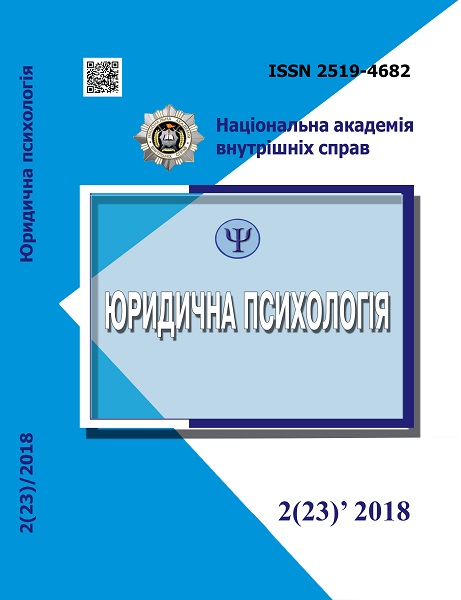Peculiarities of the Legal Awareness of Modern Policemen Depending on Length of Service in Law Enforcement Agencies
Abstract
In the article, on the basis of the empirical research, an analysis of the peculiarities of the formation of police officers’ legal awarenessin the professional environment is presented. The study was attended by 184 respondents. Depending on length of service in law enforcement agencies, the sample was divided into three groups. The first group includes police officers whose length of service in law enforcement agencies does not exceed 3 years, the second group – policemen who have length of service in law enforcement agencies from 3 to 10 years, to the third group – from 10 to 20 (and more than 20 inclusive). The questions of the questionnaire included the identification of the opinion and assessment by each respondent of their professional environment (subordinates, colleagues, management) regarding: observance of their legal norms during the performance of official duties and out of service; the presence of facts of abuse of official position or performance of tasks not related to official duties, etc. Particular attention was paid to the readiness of law enforcement officers to assist each other in resolving professional issues. According to the results of the study, there were statistically significant differences regarding the peculiarities of the formation of police officers’ legal awarenesswith different length of service. Among police officers withlength of serviceof up to 3 years, there was the largest number of respondents who encountered difficulties when answering questionnaires and those who need help and support in dealing with professional issues. In addition, half of them believe that they are surrounded by police officers who, because of ignorance of some laws, violate legal norms. The respondents with length of service from 3 to 10 years are the most confident in their own views, knowledge, and experience. Respondents with length of service for more than 10 years have indicated that their subordinates, colleagues or leadership are always ready to assist in solving their professional issues. Along with this, the relationship between the development of the cognitive component of police officers’ legal awareness, their desire for further improvement of their abilities, and active actions for professional duty as a conscious necessity, depending on their length of service in law enforcement agencies, has been identified.
Downloads
Abstract views: 154 PDF Downloads: 373
- Authors reserve the right to authorship of their own work and transfer to the magazine the right of the first publication of this work under the terms of the Creative Commons Attribution License, which allows other persons to freely distribute published work with mandatory reference to authors of the original work and the first publication of an article in this magazine.
- Authors have the right to enter into separate additional agreements on non-exclusive dissemination of the work in the form in which it was published in the journal (for example, to post an article in the institution's repository or to publish as part of a monograph), provided that the link to the first publication of the work in this journal is maintained.
- The journal's policy allows and encourages the posting of articles by authors on the Internet (for example, in electronic storehouses of institutions or on personal websites), both before the submission of this manuscript to the editorial office and during its editorial processing, as this contributes to the creation of a productive scientific discussion and positively affects the efficiency and dynamics of citing the published work.




